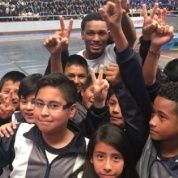Have you ever wanted to learn Quechua? Here's a good place to start: sumak kawsay.

In Spanish, it's translated as "buen vivir." In English, it means "good living."
It's a phrase you'll probably see a lot if you visit Ecuador.
When Ecuadorean President Rafael Correa took office in 2007, sumak kawsay became a rallying cry for the democratic socialist Citizens' Revolution he ushered in.
It not only paid homage to Ecuador's historically-marginalized Quechua people. It also signaled what was to come: mass government investment on social programs that would establish "good living" for all citizens.
Today, the Citizens' Revolution is world renown for improving healthcare, education, housing, and labor laws in Ecuador. But there's another area of social improvement Correa's administration is responsible for that is little known to many outside of the country: sports.
RELATED:
Ecuador's Correa: $16B Invested in Health in a Decade
Since 2007, Ecuador's Ministry of Sport has played a larger role in society, creating a culture of pride and achievement in athletic activities.
Take the Olympics, for instance.
Between 2011 to 2014, Ecuadorian athletes, most of whom were youth, won 1,538 medals at world championships, regional multinational games, and Olympic competitions, Andes reports. At the 2012 Summer Olympics in London, Ecuador managed to qualify 11 more athletes than at the previous 2008 Summer Olympics in Beijing where only 25 performed.
That same year, Correa and the Ministry of Sport gave US$6 million for physical training to the athletes who participated in the Olympics.
And in 2016, the South American country sent its largest-ever delegation to the Summer Olympics in Rio de Janeiro, totaling 38 people. Alexandra Escobar, an Afro-Ecuadorean weightlifter from a working class background, nearly won the country's first Olympic medal — she placed fourth in the women's 58 kg.
But the Olympics are just the tip of the iceberg for Ecuador's transformation of sports under the Citizens' Revolution.
RELATED:
Ecuador Has the Best Social and Development Policies, Says UN
Correa's ruling PAIS Alliance party has invested millions of dollars into free and low-cost public sports programs that promote healthy living.
In the past three years alone, the Ministry of Sports' "Ecuador Workout" campaign has serviced over 420,000 people across the country's 24 provinces, Andes also reports. The campaign features free dance therapy, aerobics, and soccer activities available to citizens of all ages.
Within the same timeframe, over 6,220 schools across the country received free sports kits, mainly for youth soccer teams.
Since 2007, the Citizens' Revolution has also commissioned the construction of hundreds of free gym facilities across the country that offer workshops for at-risk youth, El Telegrafo reports. These include martial arts, gymnastics, and meditation.
Beginning in 2015, Ecuador's government has allocated over US$123 million annually for the Ministry of Sport, according to the institution's latest budget report. Within the last two years, the institution has launched new programs: a National Youth Sports competition held annually in Quito, nationwide chess tournaments, nutritional workshops, competitions for persons with disabilities, and free biochemical exams for trained athletes.
In recent years, the Ministry of Sport has also worked closely alongside the Ministry of Health on healthy living campaigns. The collaboration has proven successful.
Ecuador's investment in sports has undoubtedly played an important role in helping to improve the country's level of health.
RELATED:
Ecuador Graduates 1,500 Community Health Workers Thanks to Cuban Medics
Correa's tenure has witnessed a continual rise in life expectancy for both men and women, which is 73.5 and 79 respectively as of 2015, the World Health Organization reports. Life expectancy for both sexes increased by three years over the period of 2000 to 2012, surpassing the regional average increase of two years.
Ecuador currently has one of the highest life expectancy rates in Latin America. Prior to 2007, the South American country had one of the lowest life expectancy rankings in the region.
Tobacco use, obesity, and heart disease have also significantly decreased since 2007, according to the World Health Organization.
Overall, the Citizens' Revolution investment in sports isn't just helping the country win more accolades. It's also radically transforming the minds, bodies, and souls of its citizens. It's living up to the mantra of sumak kawsay that Ecuador's Indigenous have adhered to for centuries.